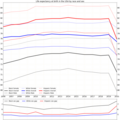Aging brain
Aging Brain[edit]
The aging brain undergoes a variety of structural, chemical, and functional changes as part of the natural aging process. These changes can affect cognitive abilities, memory, and the overall function of the nervous system. Understanding these changes is crucial for addressing age-related neurological conditions and promoting healthy aging.
Structural Changes[edit]
As the brain ages, it experiences a reduction in volume and weight. This is primarily due to the loss of neurons and the shrinkage of certain brain regions, such as the prefrontal cortex and the hippocampus, which are critical for cognitive functions and memory.

The ventricular system of the brain, which contains cerebrospinal fluid, also undergoes changes. The ventricles may enlarge, a condition known as ventriculomegaly, which is often observed in the aging brain.

Chemical Changes[edit]
Aging affects the levels of various neurotransmitters in the brain. For instance, there is a decline in dopamine levels, which can impact motor control and cognitive functions.

Similarly, changes in serotonin and glutamate levels can affect mood and cognitive abilities. The reuptake of glutamate via transporters like EAAT2 is crucial for maintaining synaptic function and preventing excitotoxicity.

Functional Changes[edit]
The aging brain often shows a decline in cognitive functions such as memory, attention, and problem-solving skills. This is partly due to the accumulation of neurofibrillary tangles and amyloid plaques, which are characteristic of Alzheimer's disease and other forms of dementia.

Cerebrospinal Fluid[edit]
The production and circulation of cerebrospinal fluid (CSF) can also be affected by aging. CSF plays a vital role in protecting the brain and removing waste products.

Life Expectancy and Aging[edit]
Life expectancy has increased over the years, leading to a larger aging population. This demographic shift has significant implications for healthcare systems and the prevalence of age-related neurological conditions.


Related Pages[edit]
Gallery[edit]
-
Diagram of dopamine and serotonin pathways.
-
Aging brain
-
Aging brain
-
Aging brain
-
Aging brain
-
Aging brain
-
Aging brain
-
Aging brain
-
Aging brain
-
Aging brain
Ad. Transform your life with W8MD's Budget GLP-1 injections from $75


W8MD offers a medical weight loss program to lose weight in Philadelphia. Our physician-supervised medical weight loss provides:
- Weight loss injections in NYC (generic and brand names):
- Zepbound / Mounjaro, Wegovy / Ozempic, Saxenda
- Most insurances accepted or discounted self-pay rates. We will obtain insurance prior authorizations if needed.
- Generic GLP1 weight loss injections from $75 for the starting dose.
- Also offer prescription weight loss medications including Phentermine, Qsymia, Diethylpropion, Contrave etc.
NYC weight loss doctor appointmentsNYC weight loss doctor appointments
Start your NYC weight loss journey today at our NYC medical weight loss and Philadelphia medical weight loss clinics.
- Call 718-946-5500 to lose weight in NYC or for medical weight loss in Philadelphia 215-676-2334.
- Tags:NYC medical weight loss, Philadelphia lose weight Zepbound NYC, Budget GLP1 weight loss injections, Wegovy Philadelphia, Wegovy NYC, Philadelphia medical weight loss, Brookly weight loss and Wegovy NYC
|
WikiMD's Wellness Encyclopedia |
| Let Food Be Thy Medicine Medicine Thy Food - Hippocrates |
Medical Disclaimer: WikiMD is not a substitute for professional medical advice. The information on WikiMD is provided as an information resource only, may be incorrect, outdated or misleading, and is not to be used or relied on for any diagnostic or treatment purposes. Please consult your health care provider before making any healthcare decisions or for guidance about a specific medical condition. WikiMD expressly disclaims responsibility, and shall have no liability, for any damages, loss, injury, or liability whatsoever suffered as a result of your reliance on the information contained in this site. By visiting this site you agree to the foregoing terms and conditions, which may from time to time be changed or supplemented by WikiMD. If you do not agree to the foregoing terms and conditions, you should not enter or use this site. See full disclaimer.
Credits:Most images are courtesy of Wikimedia commons, and templates, categories Wikipedia, licensed under CC BY SA or similar.
Translate this page: - East Asian
中文,
日本,
한국어,
South Asian
हिन्दी,
தமிழ்,
తెలుగు,
Urdu,
ಕನ್ನಡ,
Southeast Asian
Indonesian,
Vietnamese,
Thai,
မြန်မာဘာသာ,
বাংলা
European
español,
Deutsch,
français,
Greek,
português do Brasil,
polski,
română,
русский,
Nederlands,
norsk,
svenska,
suomi,
Italian
Middle Eastern & African
عربى,
Turkish,
Persian,
Hebrew,
Afrikaans,
isiZulu,
Kiswahili,
Other
Bulgarian,
Hungarian,
Czech,
Swedish,
മലയാളം,
मराठी,
ਪੰਜਾਬੀ,
ગુજરાતી,
Portuguese,
Ukrainian








